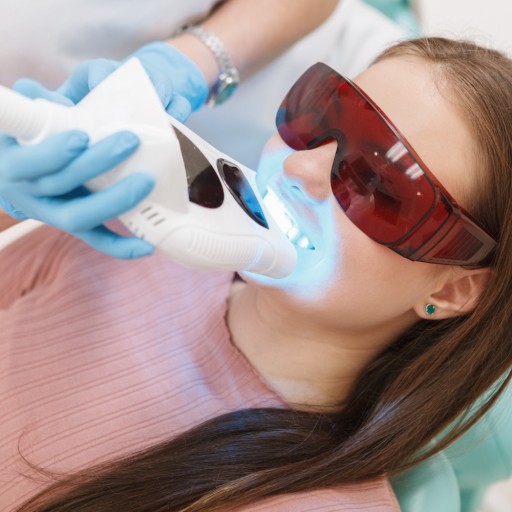Quote of Best Dental Istanbul
What is Teeth Whitening?
Teeth whitening is a cosmetic dental procedure intended to make your smile look brighter through the removal of discoloration and stains from your teeth. It helps this popular treatment gain a whiter and more radiant appearance that can bring quite a lot of confidence to one. The whitening of teeth can be done in several methods involving professional dentistry and over-the-counter products. Each method has different benefits and considerations, depending on needs and preferences.
Whitening usually involves the use of bleaching agents, hydrogen peroxide or carbamide peroxide, to break down stains and lighten teeth.
Methods of Teeth Whitening
There are varieties of teeth whitening, and each has its merits. Professional methods of teeth whitening produce immediately observable, noticeably whiter teeth. In-office whitening is applied directly to your teeth in high concentrations by a dentist in the dental office, usually with the assistance of a light to accelerate the bleaching process.
Whitening of Teeth: Safety
Teeth whitening, when carried out in the right manner, is not associated with any particular safety issues; however, there are some possible side effects one needs to be aware of: Tooth sensitivity, gum irritation, or irregular whitening results from wrong or excessive application of the whitening products.
As with any treatment, it would be better to consult the dentist before commencing whitening procedures, especially if teeth are sensitive or other problems exist in your teeth. A dentist will be able to give individual advice and to confirm that the chosen method will not be harmful for your dental health.
Results of Teeth Whitening
The effect of teeth whitening will depend on the method used and the condition of the teeth. Professional treatments can give the most dramatic and immediate results-one session could lighten the teeth by several shades.
Post-Whitening Care
After teeth whitening, good aftercare must be carried out to maintain the whitened teeth. This involves observing good oral hygiene, such as brushing and flossing, with the use of fluoride toothpaste to strengthen your teeth.
In addition, for a while, avoid foods and drinks that cause stains. Regular dental check-ups and cleaning will also keep your teeth in their best condition and problems that arise checked.
Frequently Asked Teeth Whitening Questions
Common questions that people ask of teeth whitening include how long the whitening will last whether whitening can damage the teeth, and which are the best products for sensitive teeth. Being in a position to answer such and any other questions will enable a client in arriving at a decision regarding whitening options and what to expect from the process.
It can dramatically enhance the appearance of your smile and, consequently, boost your self-confidence. Applying the right method along with after-care instructions can ensure that your bright smile truly lasts for a much longer time.
- All on 4 Implant
- All on 6 Implant
- Amalgam Fillings
- Bone Graft
- Composit Filling
- Dental Cleaning
- Dental Crowns
- Dental Filler
- Dental Implant
- Dental Veneers
- Detertraj (tooth stone cleaning)
- E-Max Veneer
- Endodontics
- General Dentistry
- Gingivectomy
- Gum Disease Treatment
- Gum Lift
- Hollywood Smile
- Orthodontics
- Periodontics
- Health Insurance
-
Accommodation
- Online Healthy Life Assistant 9/5
- Post - Experience Follow Up 6 Month
-
Extra Privileges

- Health Insurance
-
Accommodation
- Online Healthy Life Assistant 24/7
- Post - Experience Follow Up 1 Year
- Pre-Treatment Doctor Consultation
-
Extra Privileges

 Private
Private
- Health Insurance
-
Accommodation
- Healthy Life Butler
- Post - Experience Follow Up 2 Year
- World-Famous Doctor Consultation
-
Extra Privileges

* Price varies depending on extra and upgrade selections.
Teeth whitening is a cosmetic dental process designed to enhance the brightness and reduce the coloration of teeth. This minimally invasive treatment aims to eliminate stains and discoloration, resulting in a visibly whiter and brighter smile. It involves lightening the teeth color without causing harm to the tooth surface, typically requiring multiple sessions using specialized whitening gels.
Laser teeth whitening is a dental procedure where bleaching occurs through the application of a whitening gel followed by laser beams. The high-intensity light activates the whitening gel, effectively removing stain molecules from the teeth.
Pros Achieve whiter teeth after a few sessions. Quick and straightforward procedure. No pain experienced during the dentist-performed office bleaching. The tooth whitening gel is non-damaging to the tooth surface. Cons Results from teeth whitening are not permanent. Increased tooth sensitivity may occur post-procedure.
Individuals aged 16 and above with good health conditions are suitable candidates for teeth whitening.
The most recommended and secure choice is office bleaching, particularly through laser-assisted in-office whitening procedures, which prove to be highly effective in teeth whitening.
Professional tooth whitening is considered safe, posing no harm to the tooth surface or gums.
The duration of teeth whitening results varies based on individual habits, with optimal outcomes potentially lasting up to 3 years.
Common methods of tooth whitening include home bleaching and office bleaching (considered the safest option). Tooth whitening kits also exist as an alternative, but the results may differ for each procedure.
Following teeth whitening procedures, it is essential to avoid acidic and pigmented foods and beverages for 48 hours. Opting for light-colored foods and drinks is advisable, refraining from consuming items such as wine, coffee, tea, sugary foods, cocoa, lemon, cherry, pomegranate, and raspberry during this period.




